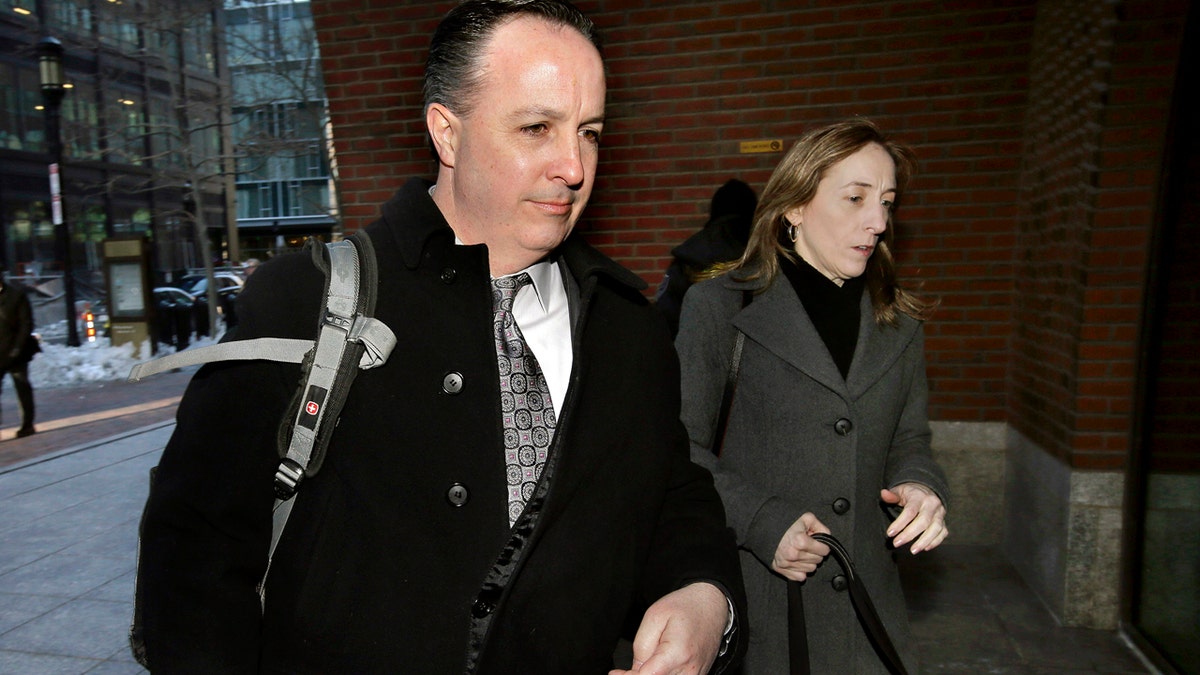
Barry Cadden, center, arrives at the federal courthouse, Thursday, March 16, 2017, in Boston, before scheduled closing arguments in his trial. Cadden, a former pharmacy executive and the president of New England Compounding Center, is charged with causing the deaths in 2012 of 25 people who received tainted steroids manufactured by the pharmacy. (AP Photo/Steven Senne) (AP)
BOSTON – The co-founder of a Massachusetts pharmacy was acquitted Wednesday of causing the deaths of 25 people but convicted of other racketeering charges in a nationwide meningitis outbreak in 2012.
Barry Cadden was charged with 25 counts of second-degree murder, conspiracy and other charges under the federal racketeering law. Overall, the outbreak killed 64 people and sickened 700 others in 20 states.
After five days of deliberations, the jury found that he wasn't responsible for the deaths. But they also found him guilty of racketeering, conspiracy and mail fraud charges.
Cadden, 50, will be released on bail while awaiting sentencing, which is scheduled for June 21.
In September 2012, the Centers for Disease Control and Prevention began investigating an outbreak of fungal meningitis and other infections in patients who had received steroid injections made by the New England Compounding Center in Framingham. The outbreak affected people in 20 states. Indiana, Michigan and Tennessee were hardest hit.
During the two-month trial, prosecutors said Cadden ran the company in an "extraordinarily dangerous" way by skirting industry regulations on sterility and cleanliness in an effort to push production and make more money.
"It was preventable, but it happened because this man, Barry Cadden, decided to put profits before patients," Assistant U.S. Attorney Amanda Strachan told the jury during closing arguments.
Cadden's lawyers said he was not responsible for the deaths. They said Glenn Chin, a supervisory pharmacist, ran the so-called clean rooms where drugs were made. Chin has pleaded not guilty to similar charges.
"As horrible as each of these stories is, there is nothing that shows that Mr. Cadden did something that the government can link to the death of that person," attorney Bruce Singal told the jury.
Prosecutors said NECC also used expired ingredients and falsified logs to make it look like the clean rooms had been disinfected when they had not.
After the outbreak, regulators found multiple potential sources of contamination, including standing water, mold and bacteria in the air and on workers' gloved fingertips. NECC filed for bankruptcy after it was hit with hundreds of lawsuits from victims or their estates. NECC and several related companies reached a $200 million civil settlement with victims and their families.
In 2013, Congress increased federal oversight of compounding pharmacies, which mix personalized medications for patients and supply them directly to hospitals and doctors.
